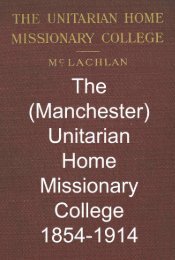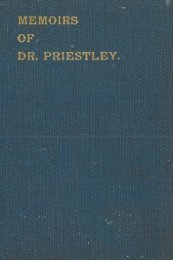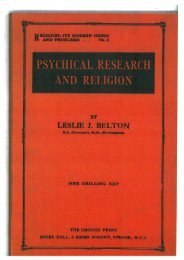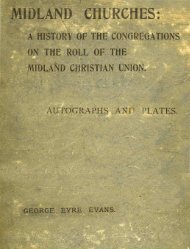Essays in Unitarian Theology by Kenneth Twinn Lindsey - General ...
Essays in Unitarian Theology by Kenneth Twinn Lindsey - General ...
Essays in Unitarian Theology by Kenneth Twinn Lindsey - General ...
Create successful ePaper yourself
Turn your PDF publications into a flip-book with our unique Google optimized e-Paper software.
ESSAYS IN UNITARIAN THEOLOGY<br />
It robs religious devotion of its special genius. Man,<br />
when engaged <strong>in</strong> religious activity and contemplation<br />
and <strong>in</strong> commitment to ideal standards of moral behaviour,<br />
feels himself to be <strong>in</strong> communion with personality<br />
similar to his own, he acknowledges that he is<br />
#<br />
susta<strong>in</strong>ed, energized, prompted and guided <strong>by</strong> it.<br />
He dist<strong>in</strong>guishes between this experience and any<br />
U<br />
natural piety which might l<strong>in</strong>k his spirit with the<br />
.L<br />
-<br />
grandeurs of: cosmic process. In specifically religious<br />
U<br />
ex~erience men feel their own personality <strong>in</strong>vaded <strong>by</strong><br />
I<br />
God's rather than <strong>by</strong> an <strong>in</strong>f<strong>in</strong>ite energy which shapes<br />
the star systems and gathers up the radiations of a<br />
million miles to make a liv<strong>in</strong>g satellite of the sun.<br />
-<br />
This - - felt <strong>in</strong>terfusion of the div<strong>in</strong>e with the human<br />
suggests that the symbolism cc Fatherhood of God ",<br />
<strong>in</strong> the sense of a personality from which human per-<br />
J.<br />
sonality derives its be<strong>in</strong>g and strength, is not outworn.<br />
Such spiritual <strong>in</strong>sights, however, are notoriously<br />
subjective, they are not shared <strong>by</strong> all, nor felt at all<br />
times <strong>by</strong> those who experience them. Search<strong>in</strong>g ques-<br />
tions hive been asked of such mysticism. What part<br />
do human wish and the desire to transcend the <strong>in</strong>-<br />
tolerable sense of man's cosmic lonel<strong>in</strong>ess play <strong>in</strong> the<br />
experience? How much is the awareness of a div<strong>in</strong>e<br />
1<br />
personality a projection of an <strong>in</strong>ternal psychic situa-<br />
tion? The frail conscious ego of a man is <strong>in</strong>vaded <strong>by</strong><br />
other portions of his psychic life : <strong>by</strong> the under-swell of<br />
his libid<strong>in</strong>al energy releas<strong>in</strong>g erotic emotions, so that<br />
he feels himself immersed <strong>in</strong> a sea of rapture; <strong>by</strong> the<br />
restra<strong>in</strong><strong>in</strong>g forces of a well-developed super-ego, so that<br />
he feels constra<strong>in</strong>ed <strong>by</strong> - the imperatives and discipl<strong>in</strong>es<br />
and driven <strong>by</strong> the compulsions of father-figures; <strong>by</strong><br />
dormant racial archetypes, so that he feels currents<br />
IMAGES OF GOD<br />
of personal forces vaster than himself sweep<strong>in</strong>g him to<br />
heroic or tragic issues. The fact that such questions<br />
have been seriously asked and seriously exam<strong>in</strong>ed is<br />
evidence that the argument from direct religious<br />
experience is not as f<strong>in</strong>al as it is usually claimed to be.<br />
Nor does this type of experience po<strong>in</strong>t exclusively to<br />
the existence of an objective div<strong>in</strong>e personality. Men<br />
can and do commune <strong>in</strong> a very real sense with im-<br />
personal nature; they feel en rapport with the mood,<br />
strength or beauty of the natural world around them.<br />
Such communion often rises to an awareness of a<br />
CC presence " mov<strong>in</strong>g <strong>in</strong> or through the sights, sounds<br />
and movements of the physical world. This has been<br />
taken as a surrogate for deity, but it does not neces-<br />
sarily imply personality. Quite the reverse, sometimes.<br />
A man is swamped <strong>by</strong> the immensity and ravelled<br />
<strong>in</strong>tricacy of existence around him, <strong>by</strong> the felt <strong>in</strong>f<strong>in</strong>itude<br />
of it, sometimes <strong>by</strong> its very impersonality, its sublime<br />
unconcern for human happen<strong>in</strong>gs. Confronted with<br />
someth<strong>in</strong>g not himself, someth<strong>in</strong>g which moves <strong>in</strong>-<br />
exorably <strong>by</strong> purposes not his own, or <strong>by</strong> no conceivable<br />
purposes at all, he still has communion with it. There<br />
is a very real and not uncommon .natural mysticism<br />
which does not imply personality <strong>in</strong> the object of<br />
reverence, and for which the term " Father " fails to<br />
express the core of the experience.<br />
The question then arises: how far can one go <strong>in</strong><br />
discard<strong>in</strong>g traditional symbols ? If the Fatherhood<br />
and Personality of God are felt to be <strong>in</strong>adequate, what<br />
of the <strong>Unitarian</strong> favourites: God as Spirit, Goodness,<br />
Truth, Beauty ? These are verbal symbols, general<br />
abstract concepts which do not readily translate <strong>in</strong>to .<br />
rich imagery. By " spirit " we mean a depth and






